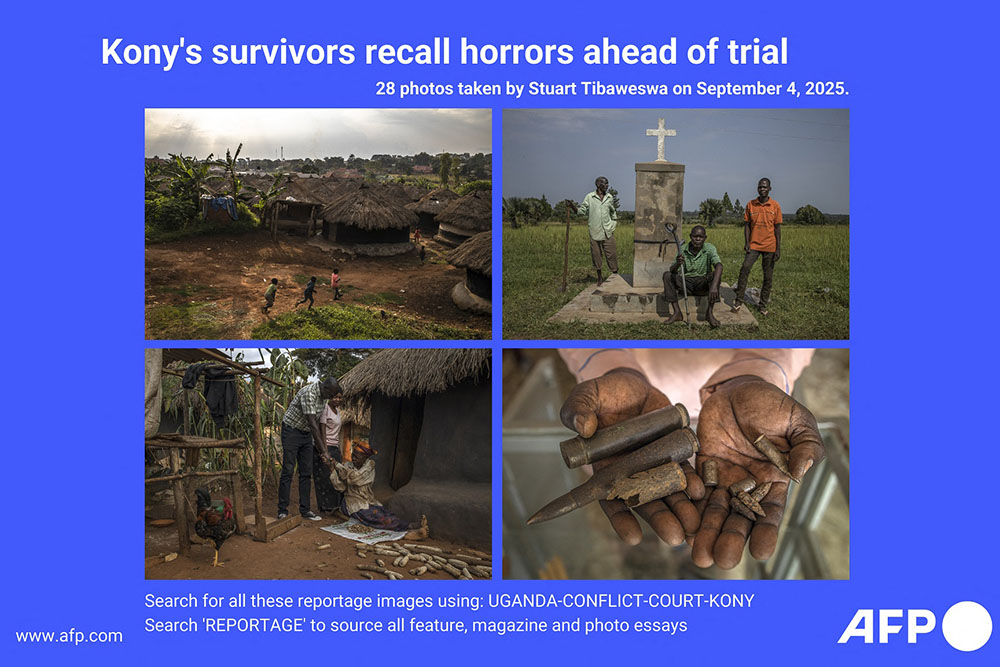Joseph Kony: Brutal rebel chief eluding capture for decades
Kony's marauding insurgency claimed to be fighting to overthrow the Ugandan government and impose a regime based on the Bible's Ten Commandments, but became infamous for horrific kidnappings and mutilations.
The court will finally start hearing charges on Tuesday against Kony, including murder, torture, rape, sexual slavery and pillaging in its first-ever in-absentia hearing. (New Vision/Files)
KAMPALA - Rebel commander Joseph Kony led a campaign of terror across Uganda and neighbouring countries for decades, and has never been caught despite an international campaign to bring him to justice.
The former Catholic altar boy, born in September 1961, became one of Africa's most notorious rebels heading his Lord's Resistance Army (LRA), combining religious mysticism with an astute guerilla mind and bloodthirsty ruthlessness.
Kony's marauding insurgency claimed to be fighting to overthrow the Ugandan government and impose a regime based on the Bible's Ten Commandments, but became infamous for horrific kidnappings and mutilations.
It has killed more than 100,000 people and abducted 60,000 children who were forced to become sex slaves, soldiers and porters, operating across the porous borders of Uganda, Sudan, South Sudan, Central African Republic and Democratic Republic of Congo.
In 2005, the self-proclaimed prophet and four of his deputies became the first people indicted by the International Criminal Court (ICC) in The Hague for war crimes and crimes against humanity.
The court will finally start hearing charges on Tuesday against Kony, including murder, torture, rape, sexual slavery and pillaging in its first-ever in-absentia hearing.
Multiple international actors have joined the hunt for Kony.
The United States passed a law in 2010 to deploy around 100 special forces to work with regional armies and offered $5 million for information leading to his arrest.
By then, Kony's power was much diminished by defections, deaths and surrenders.
But the US abandoned its hunt in 2017 and defectors have continued to confirm Kony's survival.
A report by a United Nations panel of experts in June 2024 said Kony had been forced to leave long-held bases in Sudan due to its civil war, and had relocated to a remote part of the Central African Republic.
It was there that several members of his militia were able to escape in March 2024. Russian mercenaries targeted a suspected hideout the following month but Kony had recently left, the UN report said.
AFP presents a reportage of 28 pictures taken by photographer Stuart Tibaweswa taken in Gulu, Uganda on September 4, 2025 of Ugandan warlord Joseph Kony's survivors recalling horrors ahead of his trial.
Messianic rebels
A member of Uganda's northern Acholi ethnic group, Kony took up arms around 1987, following in the footsteps of another messianic rebel, Alice Auma Lakwena, a former sex worker believed to be either his cousin or aunt.
Lakwena, who died in Kenya in 2007, believed she could channel the spirits of the dead and gave her followers what she called holy oil that could stop bullets.
Kony claimed the Holy Spirit issued orders to him on everything from military tactics to personal hygiene.
The rebellion claimed to be defending the Acholi people against President Yoweri Museveni, who seized power from northern military rulers at the head of a rebel army in 1986 and remains in power almost 40 years later.
Kony's policy of abductions soon lost him support in the region as the conflict drove around two million people into camps.
ALSO READ:
• Kony's ICC lawyers in Uganda for engagement with LRA victims
• New details on Kony whereabouts emerge, Russians join hunt
• Govt welcomes Joseph Kony wife, children
Spillover
In an interview with a Western journalist in 2006, Kony insisted he was "not a terrorist" and was "fighting for democracy".
But ex-LRA abductees say they were forced to maim and kill friends, neighbours and relatives, and participate in gruesome rites such as drinking their victims' blood.
In the 1990s, the conflict spilled into neighbouring countries as Sudan's government began backing the LRA in retaliation for Uganda's support of southern Sudanese rebels.
That support dried up when the Sudanese factions signed a peace deal in 2005 and, after being forced into neighbouring DR Congo by the Ugandan army, Kony agreed to peace talks.
Mutual distrust and anxiety over the ICC warrant meant Kony repeatedly failed to turn up to sign a deal.
Kony gained unexpected worldwide prominence in 2012 thanks to a viral YouTube video, "Kony 2012", calling for greater efforts to capture him, which garnered more than 100 million views in just a few days.
The video was an example of early optimism around social media activism, but the campaign's momentum quickly waned.